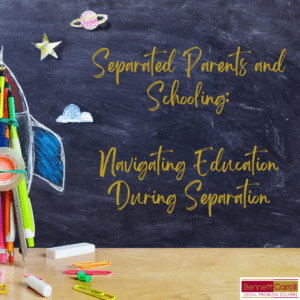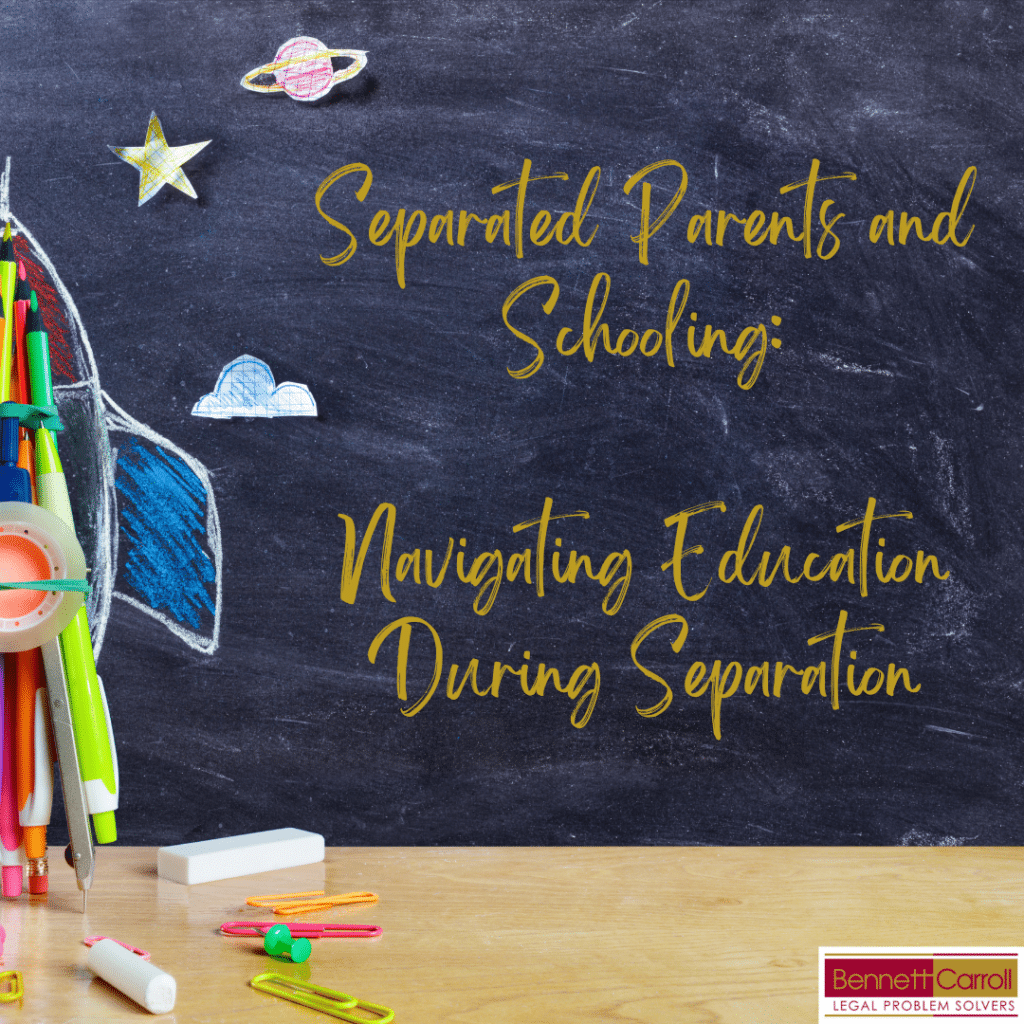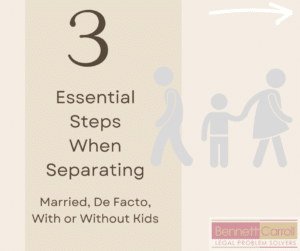Separation is a challenging time for any family, and one of the most significant areas of concern for parents is how to manage their children’s schooling. As parents work through their emotional and practical challenges, ensuring that the children continue to have a stable and supportive educational environment is essential. At Bennett Carroll Solicitors, we understand the importance of co-parenting and offer guidance to separated parents on how to handle schooling and other matters effectively.
The Impact of Separation on Children’s Education
Children often feel the effects of their parents’ separation in various ways. The change in family dynamics can lead to emotional distress, which can, in turn, impact their focus and performance at school. However, with the right support, most children can adapt successfully to these changes.
One of the first steps is ensuring that both parents remain actively involved in the child’s education. This involves maintaining open lines of communication with the school and each other. By doing so, both parents can stay updated on academic progress, school events, and any potential issues that arise.
Co-Parenting and School Decisions
After a separation, both parents typically continue to share decision-making responsibilities regarding their children’s schooling. This includes choices about school attendance, extracurricular activities, and participation in parent-teacher meetings. However, when parents cannot agree on educational decisions, it can become a source of tension.
In such cases, it may be helpful to explore mediation services to resolve disputes. Mediation can provide a neutral space where both parents can express their concerns and find common ground regarding their child’s education. This process helps ensure that decisions are made with the child’s best interests at heart, reducing conflict and promoting a cooperative co-parenting relationship.
Creating Consistency for Your Child
In many cases, consistency is key when it comes to schooling during separation. Children benefit from having a stable routine, and maintaining continuity in their school life is crucial. This means both parents should aim to:
- Ensure the child has the same school materials and support across both homes.
- Keep consistent routines for school drop-offs and pick-ups.
- Discuss any special needs or support the child may require at school, such as tutoring or psychological support, ensuring both parents are aligned in providing it.
By working together to maintain consistency, parents can help alleviate the emotional strain children may experience during this transition.
Custody and Schooling Arrangements
In some cases, one parent may have primary custody, while the other may have shared or visitation custody. In these cases, determining how the child will transition between homes and how school matters will be managed is essential.
- Primary Residence: The primary residential parent is typically the one who handles most of the school-related matters, but both parents should remain involved in decision-making.
- Shared Custody: For parents sharing custody, the child may spend equal time in both households. In this scenario, creating a shared calendar or communication plan can help both parents stay on top of school events and deadlines.
It’s essential for parents to have a clear understanding of their responsibilities and rights when it comes to schooling and to keep the child’s best interests as the priority.
Before and After School Care Arrangements
Before and after school care arrangements are another important aspect of schooling that separated parents need to coordinate. In cases where both parents work or have commitments that overlap with school hours, ensuring the child has a reliable care routine is crucial.
Parents should discuss and agree upon who will arrange before and after school care, as well as the logistics of drop-off and pick-up. If the child is spending equal time in both homes, both parents should ideally share the responsibility, ensuring the child’s care is consistent across both households.
School Holiday Arrangements
School holidays can be a particularly challenging time for separated parents, as both parents may want to spend quality time with their child. To prevent confusion and conflict, it’s important for parents to agree on holiday arrangements well in advance. This includes decisions about:
- Where the child will spend the holidays (with one parent or alternating between both homes).
- Any special activities or trips planned during the holidays.
- Ensuring that the child has a relaxing, enjoyable time during the break, free from the stress of parental conflict.
A well-established plan can help make the school holidays a time of enjoyment for both parents and the child, rather than added stress.
Read also:
Parenting Arrangements During School Holidays: What Families Should Know- Family Law
Upcoming School Holidays & Your Children
Letting the School Know
Communication with the school is key to ensuring that everyone involved in the child’s education is aware of the separation. Parents should inform the school of the changes in custody and any specific details they need to know, such as:
- Which parent will be responsible for school-related communications.
- Any changes to pick-up and drop-off arrangements.
- Special instructions, such as permission for one parent to attend parent-teacher meetings or school events.
It’s important to ensure that both parents are kept in the loop regarding school activities, so the child feels supported by both parents during this time of transition.
School Events Not on Your Day
One area where parents may need to coordinate is school events that fall on a parent’s non-custodial day, such as parent-teacher meetings, sports days, or school performances. When these events arise, it’s important for both parents to communicate openly and, if possible, make arrangements for the non-custodial parent to attend. This could include adjusting pick-up and drop-off times or agreeing on attendance at significant school events to show a united front and continued involvement in the child’s life.
If coordination proves difficult, mediation or professional guidance can assist in reaching an amicable arrangement that serves the child’s best interests.
Legal Support for Separated Parents
If disputes arise regarding school-related decisions, holiday arrangements, or other co-parenting issues, it’s important to seek legal advice. Bennett Carroll Solicitors can help separated parents understand their legal rights and responsibilities, provide mediation services, or assist in resolving more complex issues through family law courts if necessary.
Our experienced team is here to support separated parents during this challenging time. Whether it’s navigating the complexities of co-parenting or seeking advice on specific legal issues related to education, we are here to guide you through the process.
Conclusion
Co-parenting through separation can be difficult, especially when it comes to schooling and other important areas of your child’s life. By maintaining open communication, staying involved in school activities, and working together to create consistency for your child, both parents can help ease the transition and provide the emotional stability their child needs.
If you’re facing challenges or need legal advice regarding your children’s schooling, contact Bennett Carroll Solicitors for guidance and support. We are dedicated to helping families navigate these difficult situations with the best interests of the child always at the forefront.
🌐 Whether you’re dealing with parenting challenges, divorce, separation, or family mediation, Bennett Carroll Solicitors is here to help. Our family lawyers, located in north Brisbane, south Brisbane, the Gold Coast, Sunshine Coast & Ipswich are ready for a confidential chat when you’re ready to discuss your situation.
📚 Explore additional resources on our Family Law Page.
Call us on 1300 334 566 or email info@bcglaw.com.au and safeguard your interests every step of the way- We are your legal problem solvers.
See also:
School and Childcare Arrangements After Separation: What Parents Need to Know
Child custody and parenting arrangements
Children and family law
Enrolment in state primary, secondary and special schools …









